Network Operator Groups (NOGs) are an essential part of the Internet community, carrying out a similar function to the RIPE community on a national or local level. We look at the results of a recent survey we carried out to learn more about how NOGs are keeping local Internet communities connected.
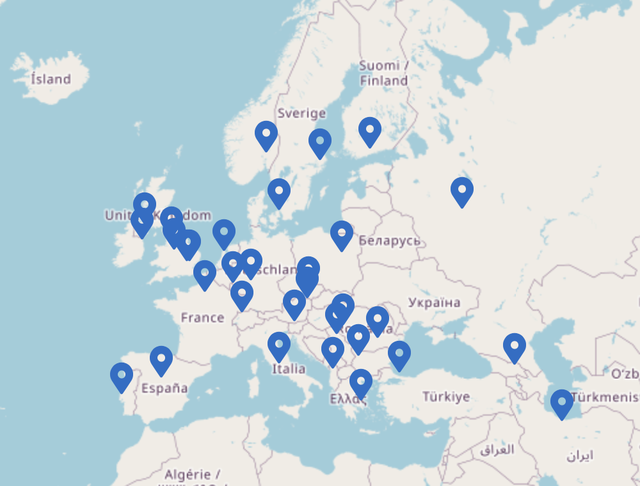
There are over 32 active NOGs in our service region and we work closely with them to support their activities and help them grow their communities. Although these communities share many values and goals, their focus differs depending on what local challenges they face.
In September 2022, in collaboration with NOG organisers, we conducted a survey for both NOG Coordinators and NOG Participants. We wanted to get a better understanding not only of the challenges NOG organisers face when running a NOG, but also of the needs of NOG participants across the region. The surveys were open for 8 weeks and we received over 400 responses from local NOGs throughout the RIPE Community.
What did we learn from the survey?
NOGs come in a variety of shapes and sizes. The largest, by participation, are PLNOG - with over 800 attendees - and UKNOF - with over 350. The oldest NOG (SwiNOG) was founded back in 2000, and the newest addition to the NOG family as I write this is NOG.HR, which held its first meeting just last November.
NOG Coordination
Organisation
NOGs are typically led by some form of organising body that handles the coordination of day-to-day operations and events. Respondents to our survey - part of which was aimed exclusively at NOG organisers - reported numbers of organisers for their NOGs in the range of 1 to 26 (the average being 8). That said, 76.5% also stated that their NOGs rely on support from volunteers outside the main organising body in order to function.
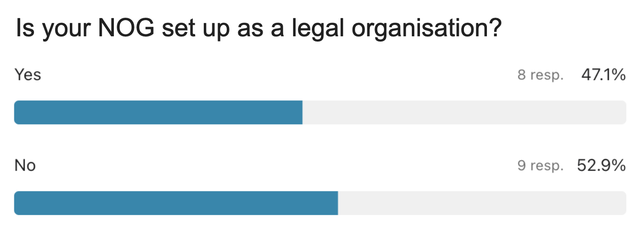
Perhaps one of the more surprising findings of the survey was that, although many NOGs are established as foundations or associations, the majority are not - and 78% of those indicated they have no immediate plans to do so.
Respondents noted some of the challenges this can bring - e.g. relying on personal bank accounts can be a problem for sponsors who would rather not transfer money to a person, but also for setting up contracts when hiring venues. This is noteworthy when you consider that the majority of NOGs reported sponsorship and donations as main sources of funding.
Events
Most NOGs are built around events aimed at bringing the community together. While some NOG organisers we heard from hold just one such event each year, many hold more, with some even reporting 12 events of some sort or other taking place through the year.
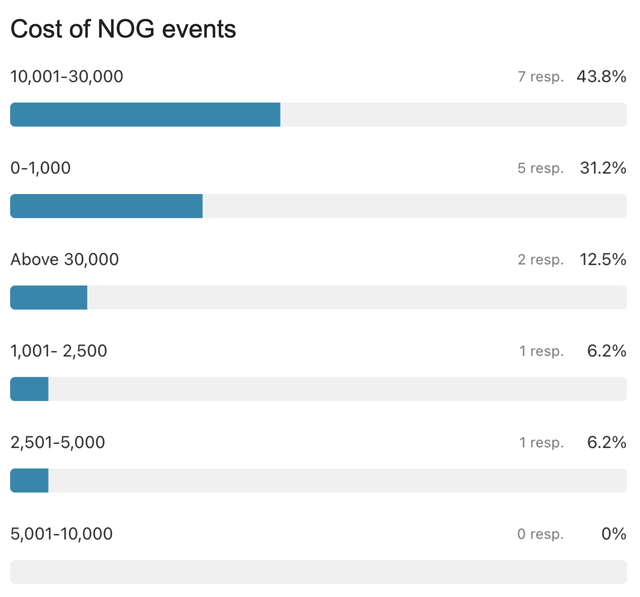
While most NOG events have anywhere between 50 and 200 attendees, some placed themselves in the 200+ category. And while many we heard from prefer day-long events, we also found that a lot of NOGs opt to hold evening events. Of course, all this has an impact on cost. While reported costs varied, close to half put the cost of NOG events between 10,000 and 30,000 EUR.
Given the cost of NOG events and the level personal commitment these events demand from volunteers, the question arises as to what defines a NOG - the events, or the community and ongoing discussion that takes place outside of them?
Communication
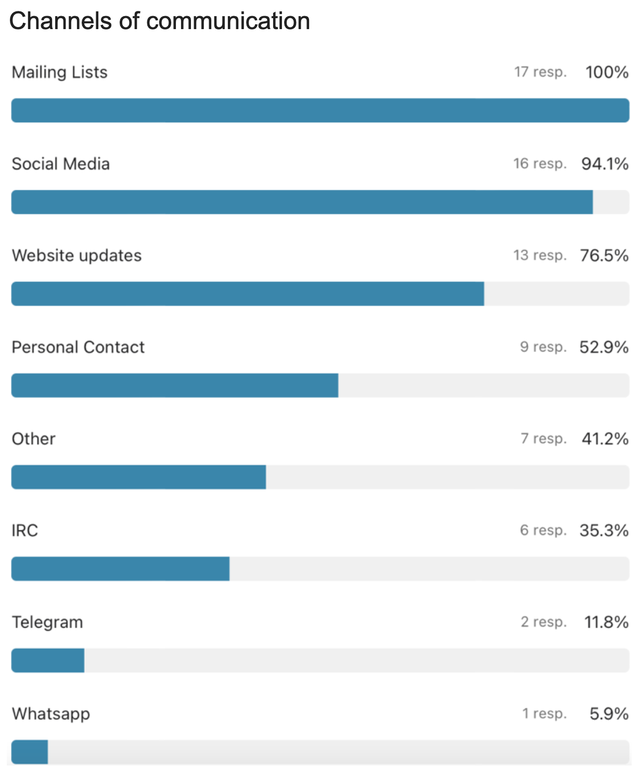
With regards to discussions taking place outside of events, we wanted to get a better idea about the communication methods and channels that are used to keep the community informed and coordinated around important topics. Unsurprisingly, mailing lists are still used by all, website updates and social media are also used by the majority, and personal contact is also still key. Contrary to what we expected, the survey results revealed that IRC is used by well less than half of respondents.
Over 30% of participants are not active on communication channels, and they all have various reasons why. Often mailing lists can have discussions and messages that are not always relevant to subscribers’ day-to-day work. This can mean people don't have the time to go back and catch up on discussions that have taken place.
A number of people also left comments to the effect that mailing lists are dead - Slack or Discord are the way to go. However, this also has its challenges as it can be hard to follow certain topics with multiple chats taking place at once.
Why people attend NOGs
The next part of the survey was focused more on the attendees and we wanted to find out why people attend NOGs, which content they want to see, what prevents them from attending and learn more about remote participation.
We asked respondents to rank the most important reasons to attend a NOG meeting, The top 3 scoring reasons were social networking, presentation/content and learning.
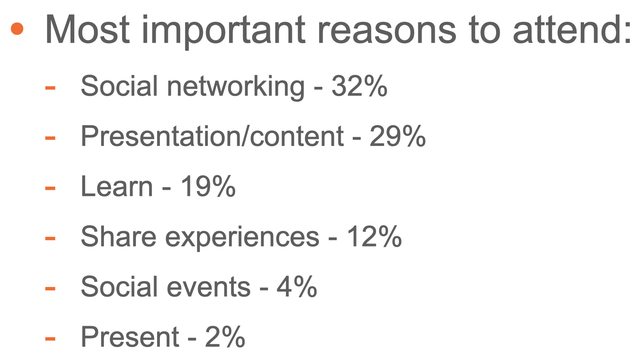
Remote participation remains important for people who are unable to attend but the costs of hybrid events are proving to be too high for smaller NOGs. Especially when you factor in the most important reason for people to attend in the social networking aspect. How do we do this remotely? The RIPE NCC has tried a few different ways including using Spacial Chat, interactive booths, and even remote hubs. These have seen moderate success, but again, the costs are too high for smaller NOGs
There are many reasons why someone might not be able to attend a NOG event in person. Overall, time, cost, and location can prevent people from attending. Getting time off work for something that isn’t directly linked to a person's job can be a challenge. Location was an interesting one - we often think of major cities/capitals as the most obvious places for hosting events but respondents noted the associated travel costs and need for overnight stays.
One answer that stood out to me was “I don’t know anyone there!” This highlights another important fact with regards to attendance. How do we attract and keep new members engaged? If people are nervous to attend, what can be done to ease them?

In terms of content, most of the respondents are interested in such regular topics as Networking, Routing, Automation, and Open Source Software. However, we also wanted to find out what level of complexity of content they wanted to see.
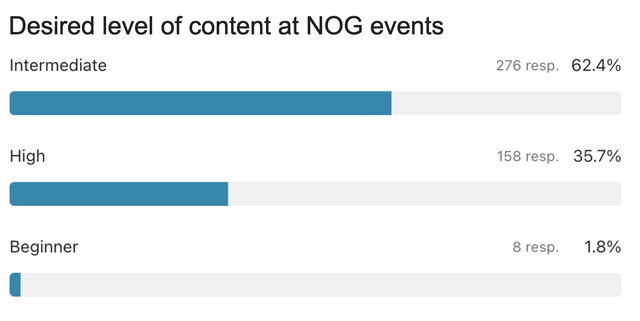
We wanted to find out more information with regards to what can NOGs do to encourage people to attend events. We used a free text answer and the responses were varied.
As noticed earlier, time and cost are the main reasons people are unable to attend. NOGs are usually held in capital cities which can also prevent people from attending due to travel and hotel costs. For some people, the event fees can be too high, though, it is important to remember that organising NOG events is not for free and often these fees only cover the event costs. Lightweight events such as NetMcr and NetLdn are becoming more and more popular as they are often held in the evening and are more social than full-day events.
What's next for NOGs?
It can be hard to predict what issues might emerge across the RIPE region in the year ahead. As we see a shift into more hybrid-style events following the pandemic, it will be interesting to see how NOGs continue to evolve and improve inclusion. Remote participation remains an important thing for those who are unable to attend in person but has its drawbacks. Not only do remote participants miss the social networking aspect, they are also often expensive to run which can be a big challenge for smaller NOG events.
Attracting younger people remains another challenge as they are often entry-level employees who do not get as many opportunities to attend events. Smaller meet-up events seem to be a great way to give new people in the industry a more relaxed introduction to the community and I hope to see more of these pop-up events organised by the community.
One thing is clear, NOGs are an important part of RIPE bringing together local communities to share knowledge, meet and discuss what is happening in the industry. NOGs are nothing without community support, so please, support your local NOG by attending, partaking in discussions, answering calls for presentations and if possible volunteering your time to help run and organise your next local NOG event!






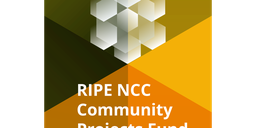
Comments 0
Comments are disabled on articles published more than a year ago. If you'd like to inform us of any issues, please reach out to us via the contact form here.